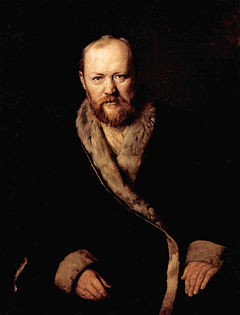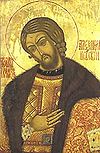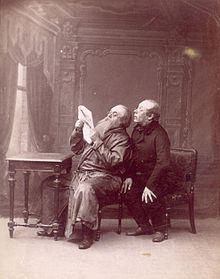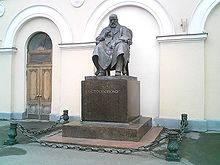- Alexander Ostrovsky
-
Alexander Ostrovsky 
Portrait of Ostrovsky by Vassily Perov.Born Александр Николаевич Островский
12 April [O.S. 31 March] 1823Died 14 June [O.S. 2 June] 1886 Occupation Playwright • Translator Nationality Russian Period 19th century Genres Comedy • Tragedy Notable work(s) Enough Stupidity in Every Wise Man
The Thunderstorm
InfluencedAlexander Nikolayevich Ostrovsky (Russian: Александр Николаевич Островский; 12 April [O.S. 31 March] 1823 – 14 June [O.S. 2 June] 1886) was a Russian playwright.
Life and work
Ostrovsky graduated from the First Moscow Gymnasium (1835–1840) and then studied law at Moscow State University (1840–1843), which he left without having taken the final examination.
He was then employed as a clerk in the office of the Court of Conscience, and subsequently in that of the Commercial Court in Moscow. Both tribunals were called upon to settle disputes chiefly among the Russian merchant class, from which Ostrovsky was thus enabled to draw the chief characters for his earliest comedies. Among these are The Poor Bride (Bednaya nevesta), Poverty is No Vice (Bednost' ne porok), and Keep to Your Own Sledge (Ne v svoi sani ne sadis'). Of this last Nicholas I said it was not a play, but a lesson. The uncultured, self-satisfied merchant class is strikingly portrayed in The Tempest and It's a Family Affair-We'll Settle It Ourselves (Svoi liudi - sochtiomsya!).
The last-mentioned comedy was prohibited for ten years, until the accession of Alexander II, and Ostrovsky was dismissed from the government service and placed under the supervision of the police. The liberal tendencies of the new reign, however, soon brought relief. Ostrovsky was one of several well-known literary men who were sent into the provinces to report on the condition of the people. Ostrovsky's area of inquiry lay along the upper Volga, a part of the country memorable for some of the most important events in Russian history.
This mission induced him to write several historical dramas of great merit, such as Kozma Zakhar'yich Minin-Sukhoruk (the full name of the famous butcher who saved Moscow from the Poles), The False Dmitry and Vassily Shuisky, Vassilisa Melentieva (the name of a favorite court lady of Ivan the Terrible) and the comedy Voyevoda. Many of his later works treat of the Russian nobility, and include Money to Burn (Beshenye Den'gi), Without a Dowry (Bespridannitsa), and Wolves and Sheep (Volki i Ovtsy); others relate to the world of actors, such as Forest (Les), Guilty Without Fault (Bez viny vinovatye), and Talents and Admirers (Talanty i Poklonniki).
Ostrovsky enjoyed the patronage of Alexander III (his brother Mikhail was one Alexander's ministers and a member of the State Council of Imperial Russia), and received a pension of 3000 rubles a year. With the help of Moscow capitalists, he established the Maly Theatre as a model theatre and school of dramatic art, of which he became the first director. He also founded the Society of Russian Dramatic Art and Opera Composers.
Several months before his death, he was appointed repertoire director of all the state theatres in Moscow but because of his sickness had no time to start the job. Ostrovsky died of stenocardia in his estate near Kostroma at his desk while translating William Shakespeare's Antony and Cleopatra.
Works adapted in music
Several of Ostrovsky's plays have been turned into operas, mostly by Russian composers. In particular, the play The Storm (Гроза) was the inspiration behind Janáček's opera Káťa Kabanová.
His early comedy Live Not as You Would Like to [Не так живи, как хочется] (1854) was adapted as the tragic opera The Power of the Fiend (premiered in 1871) by Serov.
The historical drama The Voyevoda (Dream on the Volga) was transformed into two operas: one by Tchaikovsky (as The Voyevoda) and later another by Arensky entitled Dream on the Volga. Tchaikovsky also later wrote incidental music for a scene in the play.
The most notable Russian opera based on an Ostrovsky play is Rimsky-Korsakov's The Snow Maiden (Snegurochka). Tchaikovsky also wrote incidental music for this play.
External links
- Works by Alexandr Ostrovsky at Project Gutenberg
- Works in Russian at Lib.ru
- Review of Ostrovsky's The Forest at Manhattan's Classic Stage Company, May 2010
- The Tabakov Theatre. Alexander Ostrovsky, Wolves and Sheep 2010
People from Russia Leaders and religious - Pre-1168
- 1168–1917
- 1922–1991
- 1991–present
- RSFSR leaders
- General secretaries
- Soviet premiers (1st deputies)
- Soviet heads of state (and their spouses)
- Prime ministers (1st deputies)
- Foreign ministers
- Prosecutors general
- Metropolitans and patriarchs
- Saints

Military and explorers - Field marshals
- Soviet marshals
- Admirals
- Aviators
- Cosmonauts
Scientists and inventors - Aerospace engineers
- Astronomers and astrophysicists
- Biologists
- Chemists
- Earth scientists
- Electrical engineers
- IT developers
- Linguists and philologists
- Mathematicians
- Naval engineers
- Physicians and psychologists
- Physicists
- Weaponry makers
Artists and writers Sportspeople - Chess players
Categories:- 1823 births
- 1886 deaths
- 19th-century theatre
- Russian dramatists and playwrights
- Russian opera librettists
- Moscow State University alumni
- Hispanists
Wikimedia Foundation. 2010.


